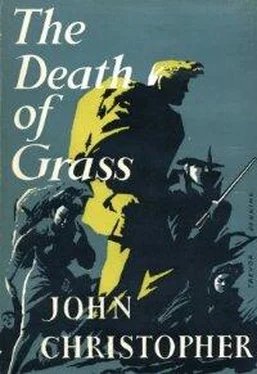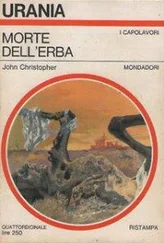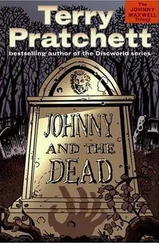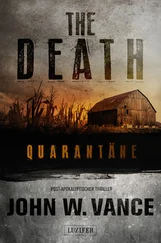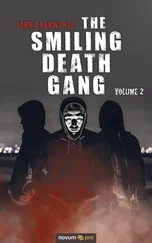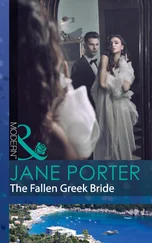Roger asked him: “Not pressing on with all speed?”
He shook his head. “We’re within reach now. We’ll be there before dark, which is all that matters. The kids are fagged out.”
Roger said: “So am I.” He lay back on the dry, stony ground, and rested his head on his hands. “Pirrie isn’t, though.”
Pirrie was explaining something to Jane, pointing out over the flat lands to the south.
“She won’t knife him now,” Roger added. “Another Sabine woman {141} 141 Sabine woman: According to the legend, the Sabine women were carried off by the Romans, but grew so fond of their captors that they placed their bodies between them and their vengeful husbands.
come home to roost I wonder what the little Pirries will be like?”
“Millicent didn’t have any children.”
“Conceivably Pirrie’s fault, but more probably Millicent’s. She was the kind of woman who would take care not to be burdened with kids. They would spoil her chances.”
“Millicent seems a long time ago,” John said.
The relativity of time. How long since I found you up in your crane? It seems something like six months.”
The moors had been more or less deserted, but when they descended to cross the lower land north of Kendal, they witnessed the signs, by now familiar, of the predatory animal that man had become: houses burning, an occasional cry in the distance that might be either of distress or savage exultance, the sights and sounds of murder. And another of their senses was touched—here and there their nostrils were pricked by the sour-sweet smell of flesh in corruption.
But their own course was not interrupted, and soon they began to climb again, up the bare bleak bones of the moors towards their refuge. Skylarks and meadow pipits could be heard in the empty arching sky, and for a time a wheatear ran along ahead of them, a few paces in front Once they sighted a deer, about three hundred yards off. Pirrie dropped to the ground to take careful aim on it, but it darted away behind a shoulder of the moor before he could fire. Even from that distance it looked emaciated. John wondered on what diet it had been surviving. Mosses, possibly, and similar plants.
It was about five o’clock when they came to the waters of the Lepe. It tumbled with the same swift urgency of pace that it had always had; here its course lay between rocky banks so that not even the absence of grass detracted from the evocation of its familiarity.
Ann stood beside John. She looked more calm and happier than she had done since they left London.
“Home,” she said, “at last.”
“About two miles,” John said. “But we’ll see the gateway in less than a mile. I know the river for several miles farther down. And a bit farther up you can get into the middle of the river, on stepping-stones. Dave and I used to fish from there.”
“Are there fish in the Lepe? I didn’t know.”
He shook his head. “We never caught any inside the valley. I don’t think they travel so far up. But down here there are trout.” He smiled. “We’ll send expeditions out and net them. We must have some variety in our diet.”
She smiled back. “Yes. Darling, I think I can really believe it now—that everything’s going to be all right—that we’re going to be happy and human again.”
“Of course. I never doubted it.”
“Dave’s stockade,” John said. “It looks nice and solid.”
They were in sight of the entrance to Blind Gill. The road squeezed in towards the river and the high timber fence ran from the water’s edge across the road to the steeply rising hillside. That part which covered the road looked as though it might open to form a gate.
Pirrie had come forward to walk with John; he too surveyed the fence with respect.
“An excellent piece of work. Once we are on the other…”
It was the crude anger of machine-gun fire that broke into his words. For a moment, John stood there, shocked. He called, more in bewilderment than anything else: “Dave!”
There was a second burst of fire, and this time he ran to get Davey and Mary. He shouted to the others: “Get into the ditch!” He saw that Mary was pulling Davey and Spooks down with her, and that Mary was already crouching in the ditch beside the road. He ran for it himself, and lay down beside them.
Mary said: “What’s happening, Daddy?”
“Where is it firing from?” Ann asked.
He pointed towards the fence. “From there. Did everyone get clear? Who’s that on the road? Pirrie!”
Pirrie’s small body lay stretched across the camber {142} 142 camber: slight convexity of surface
of the road. There was blood underneath him.
Ann caught hold of John as he began to rise. “No! You mustn’t. Stay where you are. Think of the children—me.”
“I’ll get him away,” he said. “They won’t fire while I’m getting him away.”
Ann held on to him. She was crying; she called to Mary, and Mary also grasped his coat. While he was trying to pull himself free, he saw that someone else had got up from the ditch and was running towards where Pirrie lay. It was a woman.
John stopped struggling, and said in amazement: “Jane!”
Jane put her hands under Pirrie’s shoulders and lifted him easily. She did not look at the fence where the gun was mounted.
She got one of his arms over her own shoulder and half dragged, half carried him to the ditch. She eased him down beside John and sat down herself, taking his head in her lap.
Ann asked: “Is he—dead?”
Blood was pouring from the side of his head. John wiped it away. The wound, he could see at once, was only superficial. A bullet had grazed his skull, with enough force to knock him over. There was an abrasion on the other side of his head, where he had probably hit the ground. It was very likely the fall which had knocked him unconscious.
John said: “He’ll live.” Jane looked up; she was crying. “Pass the word along to Olivia that we want the bandage,” John added. And a wad of lint.”
Ann stared from Pirrie to the fence barring the road. “But why should they fire at us? What’s happened?”
“A mistake.” John stared at the fence. “A mistake—we’ll sort it out easily enough.”
Ann tried to stop him when she saw him tying a large white handkerchief on the end of a stick.
“You can’t do that! They’ll shoot you!”
John shook his head. “No, they won’t.”
“They fired on all of us without provocation. They’ll fire at you, too.”
“Without provocation? A whole gang of us marching up the road, and with arms? It was as much my mistake as theirs. I should have realized how their minds would work.”
“Their minds? David’s!”
“No. Probably not. He can hardly be manning the fence all the time. God knows who it is. Anyway, it’s a different thing with one man, unarmed, under a flag of truce. There’s no reason why they should fire.”
“But they might!”
“They won’t.”
But he had an odd feeling as he walked along the middle of the road towards the fence, his white flag held above his head. It was not exactly fear. It seemed to him that it was nearer to exhilaration—the sense of fatigue allied to excitement that he had sometimes known in fevers. He began to measure his paces, counting soundlessly: one, two, three, four, five… In front of him, he saw that the barrel of the machine-gun poked through a hole in the fence a good ten feet above the ground; not far from the top. David must have built a platform on the other side.
He stopped, seven or eight feet from the fence, and looked up. From somewhere near the gun muzzle, a voice said:
“Well, what are you after?”
Читать дальше
